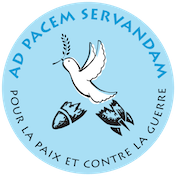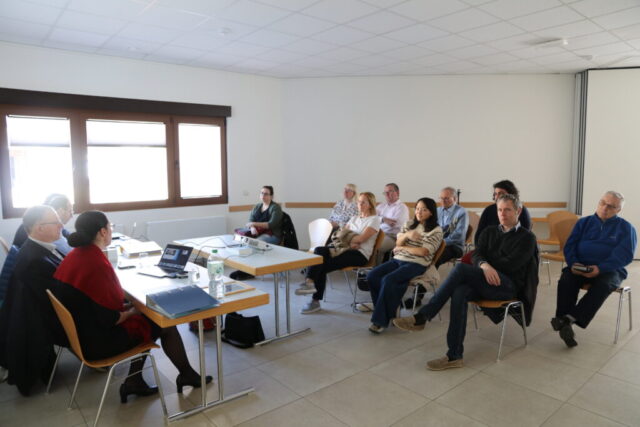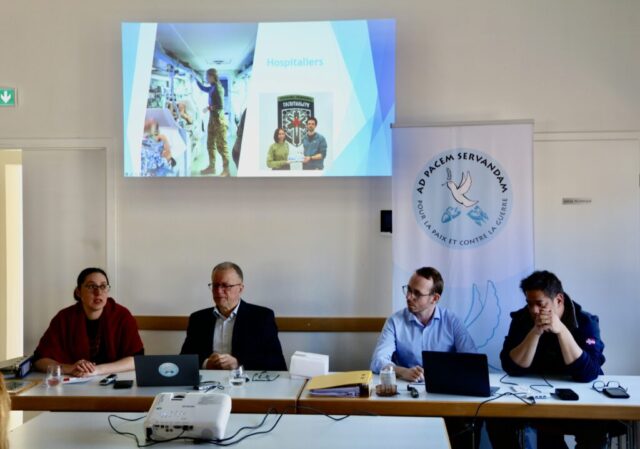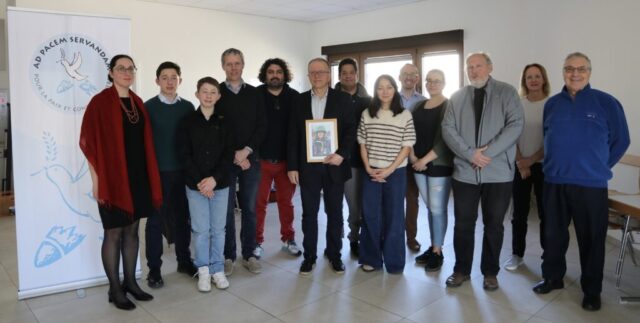On Saturday 29 March 2025, from 9.30 a.m. to 12 noon, the 8th General Assembly was held in Bascharage (L). Here is a report on the activities and assistance provided by the association during 2024, as well as its plans for the future.
1. Opening of the meeting by the president
The president of the Ad Pacem servandam association welcomed all members present, including paying members and committee members. Secretary Renaud Cecconi was excused as he had to work at the pharmacy on Saturday and was unable to attend.
The president presented the agenda: opening of the meeting, 2024 activity report, 2024 financial report, auditor’s report and provisional budget for 2025, with a ‘Miscellaneous’ item at the end.
The president proposed himself as chair of the meeting and proposed Christian Welter as secretary. All agreed.
At the beginning of the meeting, the chair noted that over the past twelve months, the value of international justice has deteriorated. The International Court of Justice has been unable to make itself heard or to bring to justice those responsible for the ongoing wars, especially Russia’s war against Ukraine. Peace is being bargained away and justice against those responsible for these wars is not being enforced. In any case, this is not noticeable, either in the media or in reality.
The ideals of justice, peace and freedom that have prevailed since the end of the Second World War are changing. They are no longer the same and their meaning is being changed by politicians and journalists. The speeches of some political leaders are distorting the meaning of peace and justice. Economic values are taking precedence over political values and ideals of freedom, justice and peace. Guaranteeing peace is subject to other criteria that did not prevail before. The media plays an enormous role in the dissemination of news. Contradictory information is reported on the same events. The people are divided between those who believe what is true and right and those who do not. This becomes more difficult when the truth is not clear to understand. The media and social networks decide what people should or can think.
After this introduction, Vice-President Natalya Pantaleoni said a few words about the late Oleksij Savkevich. On Saturday 15 March, we received news of his death at the front. Nataly knew Oleksij when he was a political science student at the University of Donetsk in the 1990s. When the Russians occupied the city in 2015, he fled with his family to Avdiivka, where he organised a Ukrainian culture festival for young people for several years. It was to support this festival that our association invited him to Luxembourg in 2019, enabling him to bear witness to the Russian aggression. With the proceeds from a charity concert, we bought musical instruments for a group of musicians of which he was one of the leaders.
The Vice-President reminds us that every day, many young Ukrainian soldiers are dying at the front. It is in learning of the death of our friend Oleksij that we can feel the deep sorrow felt by Ukrainian families who lose one of their own at the front.
There was a minute’s silence in memory of Oleksij Savkevich.
2. Report on activities in 2024
2.1 Internal work
The president first listed the internal work carried out during 2024. There were nine committee meetings, each lasting about three hours. Eight newsletters were sent to the association’s members informing them about projects, activities and important information. Since last year, we have been emailing an article that caught our attention on the subject of peace and war in Europe, which is found in magazines or media that are mostly unknown. This article, which is then selected by Ad Pacem, is sent in French only to those who wish to receive it (in 2024, there were about 80 recipients); we add the original if it is not available in French. The main purpose is to share information that we consider useful and relevant.
There is also the time-consuming task of drawing up the calendar and preparing the bike rides. These are good for health and provide an opportunity to talk about current energy dependencies.
The activity report begins with a summary of the 7th AGM, which took place in March. In the same month, the association invited Mr Jean-Arnoult Dérens, journalist and historian, to the Book Fair. Twenty years ago, he founded Le Courrier des Balkans, an online newspaper covering news from the Balkan countries. The aim of his lecture was to assess the state of the peace process in the Balkans, particularly in Bosnia and Herzegovina. Here, it is mainly the Serbs and their leaders who want to break away from the state entity to create a separate state or join Serbia.
During 2024, the association organised three bike rides (Bike for Climate – Bike for Peace), which took place mainly on cycle paths. Each time, we covered between 40 and 50 kilometres per day. Cultural visits were planned along the route. One of the rides took place over a weekend. One outing was around Arlon (18 May), and on 15 June it was near the three borders of Perl/Schengen/Mondorf, where the group also visited the Schengen Museum of Europe and the Roman villa in Nennig. Where possible, visits to institutions with a link to peace or the culture of peace in Europe are planned. On 28 and 29 September, the cycling trip took place around the Lac du Der, France’s largest artificial lake, which was built to regulate the groundwater that supplies Paris. It helps to prevent flooding in the capital Paris. All around the lake, we were able to admire the birds and wildlife that live on the lake’s shores. It was also a great opportunity to get together and spend the evening in a house that had been rented for this purpose.
Then there was the trip to Verdun to see the show ‘Des Flammes à la lumière’ (From Flames to Light) on 7 July. The inhabitants of Verdun ‘re-enact’ key moments (in the trenches, in the hospital, at home, in the public square, etc.) from the 1914-1918 war in an old quarry. Visitors have the opportunity to see and hear scenes from the war. For a few moments, you are truly immersed in the life and atmosphere of the front near Verdun. The idea behind these trips to war sites is to learn as much as possible about the realities of past wars.
During the summer holidays, we organised Concertini de solidarité (Solidarity concerts) with our children to promote peace and raise money to help victims of the war in Ukraine.
On 7 December, we were invited to Tholey, in Saarland (Germany), by an association of deacons and their wiveswho wanted to find out what activities our association organises to promote and provide information about peace.
From 29 November to 22 December, our association was present at the Differdange Christmas Market with a mother and her son who had come from Ukraine, where they live with their entire family as refugees in the west of the country after fleeing the Russian occupation of Donetsk in 2015, where they had been living. Every day, they were at the market selling traditional Ukrainian Christmas and New Year decorations. The proceeds from the sale were used to help a refuge in Ivano-Frankivsk for mothers and their children from the occupied or war-torn territories in the south and east of the country.
2.2 Report on aid in Ukraine in 2024
When the committee decides on specific aid for Ukraine, Vice-President Natalya Pantaleoni is responsible for contacts in the country and for organising the aid provided by the Ad Pacem association on the ground.
The committee has been in contact with the Kharkiv hospital for seven years because one of our first scholarship holders was a medical student in that city. She is currently a resident doctor at the hospital and our trusted representative there. Using a list of equipment compiled locally by our doctor, the necessary equipment to treat patients at the hospital was purchased locally. A second batch of equipment was sent to Ukraine. This equipment is donated to us by people who no longer need it. The delivery driver who leaves Luxembourg every week takes the equipment (bandages, liquid food, etc.) to Ukraine, where it is sent to the hospital in Lviv. Photos taken on departure and arrival document the aid sent and received. In these cases, the association only pays for delivery to the hospital.
The biggest beneficiary of our aid in 2024 was the Vorzel psychiatric hospital north of Kyiv. Everything was paid for with the proceeds from our 2024 calendar and donations from the municipalities of Differdange (L) and Dudelange (L), as well as various individual donations. Our partner Anatoly Kmetko used most of the money to buy the medicines requested by the hospital locally. He personally takes the medicines to the hospital and hands them over to the hospital managers.
In July 2024, the Vice-President travelled with her daughter Laura to the area to buy medicines and visit the Vorzel hospital, which had been occupied and ransacked by Russian soldiers during the invasion in 2022. The invaders had destroyed the windows and the weather had damaged the floors and walls (mould). Part of the money was used to renovate the intensive care rooms; the floors and wall tiles were redone. The work was completed at the end of July. Everything is documented with photos that can be seen on our website.
They also visited Chernivtsi, where Misto Dobra, the large reception centre for Ukrainian internal refugees, is located. This centre now houses three large orphanages from southern Ukraine. It takes in children who have suffered directly from the war. The aid consisted mainly of purchasing medicines and special equipment for the palliative care department and a laptop to monitor the condition of children during transport to and from the hospital and the reception centre. In September, we received confirmation that this device had directly saved the lives of several children who were transported from the front line to the reception centre. It enabled the children’s condition to be monitored and the necessary care to be provided.
The Vice-President and Laura also visited a second centre in Ivano-Frankivsk, which also takes in refugee women and children. Before the war, this centre cared for women who had suffered domestic violence or other forms of abuse. With the war, more and more women are arriving from the war zones, victims of violence by Russian soldiers or having lost everything. Two-thirds of the women are in this situation. These women receive psychological support to help them cope with their trauma and learn to carry on with their lives. With money from the association, a battery was purchased in July to provide a continuous power supply in the event of power cuts or outages. It was delivered in September. Power cuts are frequent during Russian missile attacks on Ukrainian energy infrastructure. These power cuts are dangerous for sick children and babies who are connected to electrical equipment and machines.
Throughout 2024, the Vice-President organised a total of eight shipments of humanitarian aid. These were sent to the refugee centre in Dnipro, the Vorzel hospital, the Kharkiv hospital and the centre in Ivano-Frankivsk, which also runs a social store where poor people and war victims can find food and clothing. The director of this shelter also visits villages where there are poor people who are unable to travel and need basic necessities. Aid is delivered to them on site. Especially in winter, it is important that these people have warm clothes and blankets. The Ad Pacem association will continue to support this initiative, which helps the most disadvantaged people.
The association has continued to help civilians who were in need or who were prisoners in the Isolatzia concentration camp in Donetsk.
This is the case of Mr Vitaly Matuchenko, who was released in July 2024 after spending eight years in prison. He has serious health problems and received €500 in July and the same amount in October to help him meet his basic needs. He has lost his home and is living in a hut for displaced persons in Irpine, near Kyiv. The Ukrainian state is unable to care for all these wounded and traumatised people. It is mainly civilians who are suffering.
The same is true of Mr Valery Sokolov and the couple Olena Radejeva and Enrico Cimradejeva. They too were prisoners in the Isolatzia concentration camp. They were tortured there until they were exchanged for Russian prisoners. Apart from Olena, the Vice-President met the three men in person and heard their stories of how they lost their homes and the great difficulties they are facing in finding accommodation. The fact that they had been in prison does not make their task any easier, as some employers are unable to see beyond this during job interviews. Some people think that they were in prison because they were criminals in the past. They always have to provide proof that they were in prison in the Russian-occupied territories and that they are in fact victims of war.
The association continues to provide individual assistance, such as covering the cost of eye surgery for Ms Svetlana Schuch, a refugee from Donetsk since 2014. She works in Dnipro in charitable organisations located near military structures that are subject to Russian air strikes. Once, while she was in a basement shelter, she suddenly lost her sight because veins in her eye burst. She needed several operations to regain her sight. However, she was faced with the fact that there are not enough specialist doctors and those who are capable are on the front line operating on wounded soldiers. As a result, all civilian cases are relegated to second place. Ms Schuch had to travel to Kyiv for her eye operations. During one operation, there was a Russian attack and the operation had to be interrupted because the electricity failed. In the meantime, one eye has improved slightly, but she still cannot see well with that eye. Because he often had to hide in the basement of the building, her son became seriously ill and had to undergo several operations. The association paid for all the operations for these two people, who would not have been able to afford them otherwise. These people had to flee the Russian occupation of Donbass in 2014 because they belong to the Greek Catholic Church, which is not tolerated in the territories under Russian occupation.
Another woman is Katerina Kabanova, whom the association has been supporting since 2015, when she fled Donetsk with her sick mother. They found an apartment in Bucha. But during the Russian invasion of 2022, the town was occupied by Russian soldiers who killed many civilians. Others were abused, assaulted and robbed by Russian soldiers. This was the case for Katerina and her sick, bedridden mother. The mother died and Katia is trying to rebuild her life. She is finding it very difficult to return to normal life. We invited her to come to our home, as we did during the Christmas Market, where she sold some of the items she makes herself. The assistance we provide consists of psychological support to help her resume an activity that gives meaning to her life and allows her to emerge from her ‘black hole.’ However, it remains very difficult for her to find a way to make a living.
Another aspect of our aid concerns our scholarship holders in Ukraine. There is still Suzanna Alexenkova, who is about to finish her medical studies in Kharkiv and will be a doctor in a few months. Until then, a member of our association, Mrs Umbach, is helping Suzanna with €300 per month. This enables Suzanna to rent accommodation in Kharkiv and pay for the bulletproof vests, helmet and everything else she needs to travel two weeks a month to the front line, where she helps wounded soldiers in a field hospital. With our help, she has been able to buy everything she needs to protect herself from enemy bullets.
Another scholarship recipient is Sergej, who received his bachelor’s degree in computer science from the University of Kharkiv and has been supported by the association for four years. He is a refugee from Horlivka, which has been under Russian occupation since 2015.
Then there is Stéphane, who wants to become a priest, and Vitaly, who is studying biology remotely in Kharkiv but lives in Krapivnitzky. He is an internal refugee from Kramatorsk.
In the two refugee centres in Bereshane and Krapivnitzky, our association has financed the purchase of paraffin to make trench candles for the soldiers.
2.3 Development of the 2025 calendar
An important activity was the development of the 2025 calendar, which outlines the landings of 1943 and 1944 that liberated Europe from Italian fascism and Hitler’s Nazism. The idea behind this calendar is to commemorate the four major landings in Sicily, the Gulf of Salerno, Provence and Normandy.
The proceeds from this calendar, as with previous calendars, will go to help war victims. This year, we are supporting the ‘Hospitaliers’ unit in Ukraine, where doctors and civilians volunteer for a month or two to help the wounded near the front line. Their motto is ‘For all life’, which means that they help all the wounded, whether Ukrainian or Russian civilians or soldiers. Civilians with no medical training must first take courses where they learn how to administer first aid before they can join the ‘Hospitaliers’ unit.
The first moments after an injury are crucial, which is why this unit is so important. The leaders asked if we could buy them Saros devices, which provide compressed oxygen to the wounded from the ambient air. These American devices are technically very advanced but expensive. Their batteries wear out very quickly, which is why we immediately ordered four of these batteries. In addition, there is a long waiting time to obtain them.
2.4 The Ad Pacem website
IT specialist Laurent Tran Vanmang explains how he maintains the Ad Pacem website. It is an important but also difficult task. He is always available, despite the malicious attacks and threats to which our website is exposed.
The Ad Pacem website receives a huge number of clicks from the United States, England and Canada. However, these are robots visiting the association’s website instead of humans. Laurent believes that these are mainly malicious individuals hiding their true origins. By going through websites in these countries, they want to erase their country of origin.
According to Laurent’s computer records, visits to the Ad Pacem website come mainly from the following countries: France, Poland, Luxembourg, Bosnia and Herzegovina, Germany and Russia.
From a security standpoint, in 2024, a total of 247 threats against the Ad Pacem website were blocked. These threats came mainly from Belgium, but it is difficult to know the reason for these attacks because of the systems used to cover their tracks. Laurent believes that these attacks mainly originate from Eastern European or Asian countries. These attacks may be attempts to take the site completely offline. Without the installation of a protection system, the Ad Pacem website would already have been destroyed. As one of the search engines used to access the site is Yandex, it is clear that these are actions taken by Russians.
In summary, Laurent says that the Ad Pacem website receives a lot of traffic and many threats. He constantly monitors the site to ensure that it remains accessible at all times.
3. Financial report for 2024
The financial report for 2024 was presented by Christian Welter, the association’s treasurer.
All administrative costs, operating costs for the association and the website, as well as costs related to other activities (inviting speakers, renting rooms/cabins, etc.) are covered by membership fees. In 2024, one hundred and forty-seven (147) members supported the association with their annual membership fees.
All donations are allocated 100% directly to aid provided to victims or our scholarship holders. The association has been able to help many beneficiaries, including teams of doctors from the hospitals we support, our scholarship holders, and many victims suffering from the consequences of war.
The financing and proceeds from the calendars are always spread over two years, which was also the case for the 2024 calendar.
4. Report of the auditor
Although the new Luxembourg law on associations does not require small associations such as Ad Pacem to have a cash auditor, the committee has decided to maintain this practice for the sake of transparency. Patrice Picart, who was re-elected as cash auditor at last year’s general meeting, will continue in this role. However, due to his duties as mayor of Serrouville (F), he was unable to attend on the morning of 29 March as he was attending an important municipal council meeting. Nevertheless, he had the opportunity to examine the entire 2024 accounting file the previous week. After verification, he found the treasurer’s accounts to be accurate and did not find any anomalies. He confirmed his approval of the treasurer’s report in writing.
The 2024 financial report and the auditor’s report were accepted unanimously.
5. Provisional budget for 2025
The provisional budget for 2025 was presented by the treasurer. The projected income includes membership fees, calendar sales and donations.
The projected expenditure covers activities, including events such as conferences, bike tours, visits and cultural outings. Also included are administrative and operating costs, including website costs, postage and bank charges. Finally, the majority of the planned aid is intended for victims of the war in Ukraine, the centres and hospitals that are taking them in, and various people who are suffering as a result.
6. Miscellaneous
The suspension of US humanitarian aid to Ukraine was felt immediately. We received two phone calls from people who found themselves destitute. One was receiving very expensive cancer medication thanks to this aid. When it was stopped, the person did not know how to get treatment. We are looking for ways to help them.
Another call came from the manager of the centre in Ivano-Frankivsk that we support. An underground water pipe had broken and was leaking. There were about 60 people in the house. There was no money and no source of international humanitarian aid to pay for the repairs. We financed the work.
The association’s statutes allow decisions to be made immediately in such cases without the committee having to meet. Decisions can be made by email or telephone. This gives us great flexibility to take action.
A call is made to people who would be interested in helping on an ad hoc basis.
A visit to the Museum of War and Peace in the Ardennes is planned for 2025.
A bike ride called ‘Bike for climate – bike for future’ is planned for Sunday 11 May in the German region of Saarland.
The vice-president closed the 8th General Assembly by thanking everyone for coming, and the president closed the 8th General Assembly by thanking the committee members for their work over the past year. He invited everyone to take part in a group photo and enjoy refreshments provided by the association.




